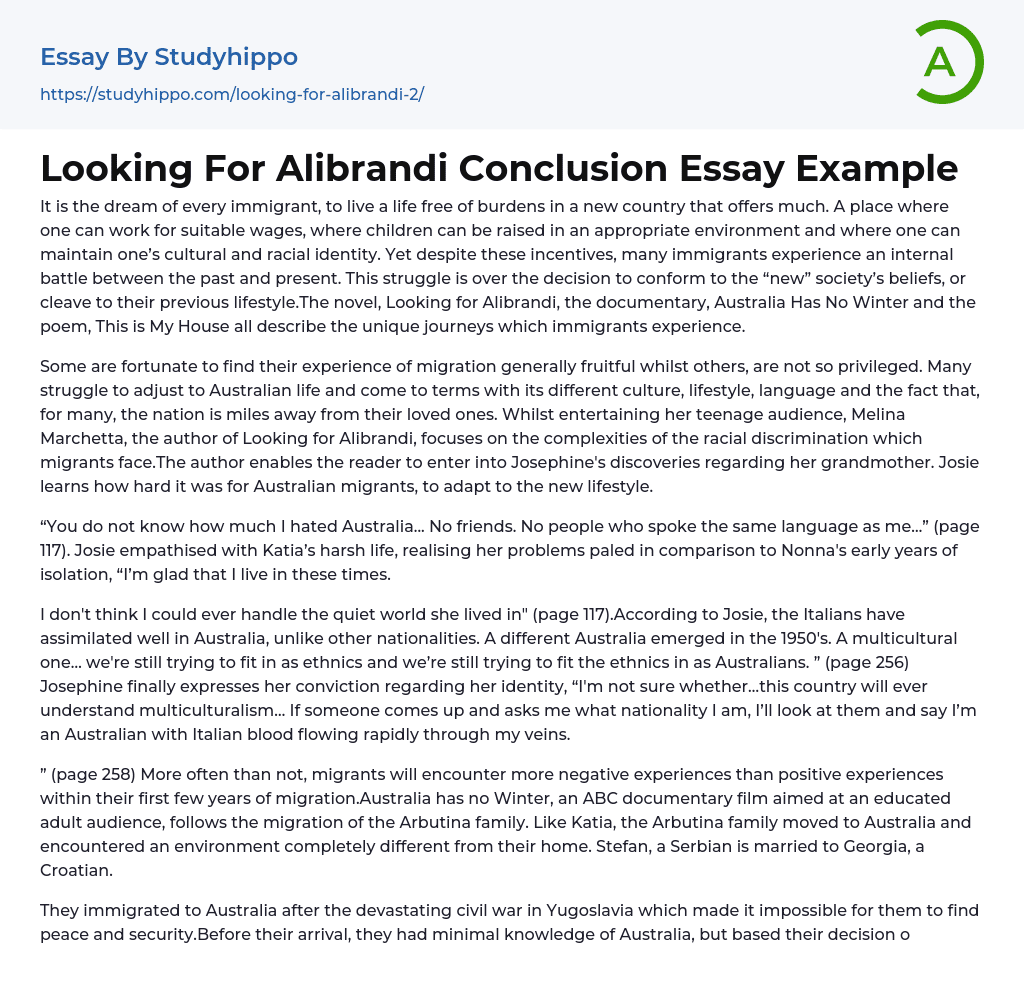It is the dream of every immigrant, to live a life free of burdens in a new country that offers much. A place where one can work for suitable wages, where children can be raised in an appropriate environment and where one can maintain one’s cultural and racial identity. Yet despite these incentives, many immigrants experience an internal battle between the past and present. This struggle is over the decision to conform to the “new” society’s beliefs, or cleave to their previous lifestyle.The novel, Looking for Alibrandi, the documentary, Australia Has No Winter and the poem, This is My House all describe the unique journeys which immigrants experience.
Some are fortunate to find their experience of migration generally fruitful whilst others, are not so privileged. Many struggle to adjust to Australian life and come to terms with its differen
...t culture, lifestyle, language and the fact that, for many, the nation is miles away from their loved ones. Whilst entertaining her teenage audience, Melina Marchetta, the author of Looking for Alibrandi, focuses on the complexities of the racial discrimination which migrants face.The author enables the reader to enter into Josephine's discoveries regarding her grandmother. Josie learns how hard it was for Australian migrants, to adapt to the new lifestyle.
“You do not know how much I hated Australia... No friends. No people who spoke the same language as me…” (page 117). Josie empathised with Katia’s harsh life, realising her problems paled in comparison to Nonna's early years of isolation, “I’m glad that I live in these times.
I don't think I could ever handle the quiet world she lived in" (page 117).According to Josie, the Italian
have assimilated well in Australia, unlike other nationalities. A different Australia emerged in the 1950's. A multicultural one… we're still trying to fit in as ethnics and we’re still trying to fit the ethnics in as Australians. ” (page 256) Josephine finally expresses her conviction regarding her identity, “I'm not sure whether…this country will ever understand multiculturalism… If someone comes up and asks me what nationality I am, I’ll look at them and say I’m an Australian with Italian blood flowing rapidly through my veins.
” (page 258) More often than not, migrants will encounter more negative experiences than positive experiences within their first few years of migration.Australia has no Winter, an ABC documentary film aimed at an educated adult audience, follows the migration of the Arbutina family. Like Katia, the Arbutina family moved to Australia and encountered an environment completely different from their home. Stefan, a Serbian is married to Georgia, a Croatian.
They immigrated to Australia after the devastating civil war in Yugoslavia which made it impossible for them to find peace and security.Before their arrival, they had minimal knowledge of Australia, but based their decision on others’ opinions. We live in hope, because many others said it’s good there…Like new born babies…life starts from the beginning, from zero. ” Like new born babies, the Arbutinas arrived in wonder and hope, dreaming of endless possibilities. The family tried hard to accept the new country, culture and especially the new language which proved to be an obstacle to their migration experience.
Stefan lost control over his family when his self-esteem plummeted as Georgia and his daughters found it easier than he did. “I’m stupid,
I’m lost…whatever advice I try to give, it’s not good enough.The move caused the parents of the family, to experience an array of health problems; anxiety attacks, depression and suicidal thoughts. In particular Stefan, the father, felt lost and worthless as he was not able to find a job immediately and put his skills to work.
As a population declines, immigrants with skills become valuable, but it’s the skills that are esteemed. Without those skills potential immigrants are denied access. This is expressed in the poem, This is My House, by Richard MacWilliam, published on the internet for an adult audience who wish to gain a different perspective on migration.Each stanza focuses on a different experience felt by migrants.
A discriminating and degrading tone is used towards immigrants in the first four stanzas though these change in the last two. “My house” refers to a country, “guest” refers to the immigrants and “street” refers to the world. The first stanza of the poem describes the unwelcoming slang immigrants hear and how some may be deported from the country. The next stanza signifies the importance of the skills that migrants bring into the country.
- Australian Culture essays
- Migration essays
- Human Migration essays
- Illegal Immigration essays
- Immigrants essays
- Refugee essays
- Afghanistan essays
- Africa essays
- America essays
- Asia essays
- Australia essays
- Caribbean essays
- City essays
- Developing Country essays
- Dubai essays
- Earthquake essays
- Europe essays
- Fracking essays
- Georgia essays
- Middle East essays
- Natural Disaster essays
- New Zealand essays
- North Korea essays
- South Korea essays
- Thailand essays
- Travel essays
- Abortion essays
- Abuse essays
- Animal Rights essays
- Animal Testing essays
- Assault essays
- Bullying essays
- Controversial Issue essays
- Crash essays
- Cyber Bullying essays
- Feminism essays
- Human Rights essays
- Immigration essays
- Inequality essays
- Poverty essays
- Prejudice essays
- Racism essays
- Torture essays
- Violence essays
- 12 Angry Men essays
- A beautiful mind essays
- A Separation essays
- Alfred Hitchcock essays
- American Beauty essays
- American Films essays




